
Christian Perrin, known by his stage-name Christian, was a French actor and singer in operetta, born in Paris, 1 January 1821, and died there in December 1889. [1] He had a long and successful career in Paris from the 1850s up to his death.

Christian Perrin, known by his stage-name Christian, was a French actor and singer in operetta, born in Paris, 1 January 1821, and died there in December 1889. [1] He had a long and successful career in Paris from the 1850s up to his death.
After his beginnings in provincial theatres, Christian made his debut in the French capital at the Théâtre des Délassements-Comiques in April 1847. His career took off with roles in Claude le Riboteur, Polkette et Bamboche, Sur la gouttière, La Bouquetière des Innocents and in revue. He moved to the Théâtre des Folies-Dramatiques in 1849 and appeared in many plays, such as Les Filles en feu, Le Bal du sauvage, La Courte-paille, Le Festin de Balthazar, Le Postillon de Crèvecœur. From 1855 at the Théâtre des Variétés appearances included Furnished Apartment, Le Théâtre des Zouaves, Le Fils du Diable, L’Homme n’est pas parfait, Les Compagnons de la truelle and Les Mousquetaires du carnaval.
His first appearance for Offenbach was in the successful premiere of La Périchole in 1868 where he played Panatellas. Christian was popular with audiences through his reputation for his ad-libbing. [1]
He featured in other revivals such as La Grande-Duchesse de Gérolstein and La belle Hélène (Agamemnon). He also appeared in the opérettes of Hervé such as Le mot de la fin and La veuve du Malabar. He appeared at the Théâtre de l'Odéon from 1870 to 1872 and then briefly at the Variétés before re-joining Offenbach at the Gaîté where he appeared in the premiere of Le Voyage dans la lune and in revised versions of Orphée aux Enfers (as Jupiter) and Geneviève de Brabant (Golo). When the 'Théâtre-Lyrique' opened at the Gaîté after Offenbach’s departure, he even undertook the opéra comique repertoire, including La poupée de Nuremberg , Giralda (Don Japhet), Les rendez-vous bourgeois and Le sourd (Doliban). [2]
In January 1875 he was withdrawn from the revival of Les brigands after a complaint from a government minister to the theatre management that Christian had introduced the actor playing Gloria-Cassis in the tones of catholic liturgy. [1]
Renowned for his constant wit, on the mirror of his dressing-room was pasted the inscription « Les raseurs sont priés de ne pas moisir ici » (Bores should not hang around here). [3] According to Vanloo, his over-the-top performance as a sea-sick passenger in the vaudeville Coco at the Théâtre des Nouveautés in June 1878 led him to pun « Que diraient mes administrés s'ils me voyaient avoir le mal de maire ? » - as he was at the time the mayor of a commune near Chantilly. [4]
The revival by Castellano of Le voyage dans la lune at the Théâtre du Châtelet in 1877 brought him back to operetta. [5] From 1878 Christian rejoined the Variétés where he featured in new stage works – Le Tour du Cadran, Coup de foudre, Le Voyage en Suisse, Les Variétés de Paris, Mam'zelle Nitouche (as Château-Gibus), La Cosaque, Mam'zelle Gavroche, Mes Anciennes – alongside popular revivals, L'Homme n'est pas parfait, La belle Hélène (Calchas), La Grande-Duchesse de Gérolstein (Boum), Le Père de la débutante, Les brigands (Pietro), La princesse de Trébizonde (Cabriolo), and Barbe-bleue (Popolani). [6]
Christian suffered a stroke at the Variétés on 20 November 1889 after a dress rehearsal for the revue Paris-Exposition and died shortly afterwards. His last words were apparently « I am dying just like Molière ». [3]

Orpheus in the Underworld and Orpheus in Hell are English names for Orphée aux enfers, a comic opera with music by Jacques Offenbach and words by Hector Crémieux and Ludovic Halévy. It was first performed as a two-act "opéra bouffon" at the Théâtre des Bouffes-Parisiens, Paris, on 21 October 1858, and was extensively revised and expanded in a four-act "opéra féerie" version, presented at the Théâtre de la Gaîté, Paris, on 7 February 1874.

La fille du tambour-major is an opéra comique in three acts, with music by Jacques Offenbach and words by Alfred Duru and Henri Chivot. It was one of the composer's last works, premiered less than a year before his death. It opened at the Théâtre des Folies-Dramatiques, Paris, on 13 December 1879, and, after a successful initial run, was frequently revived in Paris and internationally, but in recent times has not been among the Offenbach operas most frequently staged.
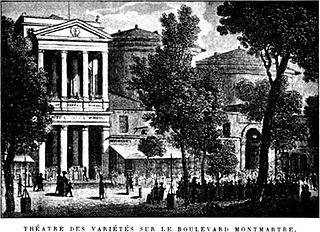
The Théâtre des Variétés is a theatre and "salle de spectacles" at 7–8, boulevard Montmartre, 2nd arrondissement, in Paris. It was declared a monument historique in 1974.
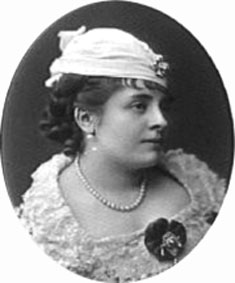
Anne Marie-Louise Damiens, stage name Anna Judic was a French comic actress.

Jules Danbé was a French violinist, composer and conductor, mainly of opera.
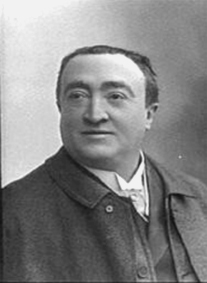
Joseph-Lambert Dupuis was a Belgian singer and actor. He was principally active in opéra-bouffe in Paris, in particular at the Théâtre des Variétés.
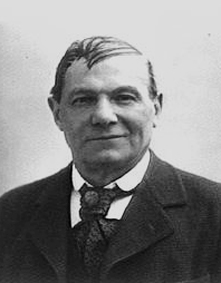
Louis Baron was a French actor and bass singer.

Juliette-Joséphine Simon-Girard was a French soprano, principally in operetta. Her father, Philippe Lockroy, was an actor at the Comédie Française, and her mother was Caroline Girard, of the Opéra-Comique.

Jean-François-Philibert Berthelier was a French actor and singer, who performed many light tenor roles in opéra-comique and opéra-bouffe.

Albert Vizentini was a French violinist, composer, conductor and music writer. His main centre of activity was the French capital, but he also worked for ten years in Russia and toured in Britain and Ireland.

Michel René Thibaut, known by his stage-name Daubray, born Nantes 7 May 1837, died Paris 10 September 1892 was a leading French actor and singer in operetta, active mainly in Paris but who also appeared around Europe.

Laurence Grivot was a French operetta singer and actress. She was the wife of Pierre Grivot.

Maître Péronilla is an opéra bouffe in three acts of 1878 with music by Jacques Offenbach. The French libretto was by the composer with Charles-Louis-Étienne Nuitter and Paul Ferrier.

Montrouge, born Louis (Émile) Hesnard, was a comic actor in French musical theatre in the second half of the nineteenth century, as well as a theatre manager in Paris.

La Dame de chez Maxim is a three-act farce by Georges Feydeau, first produced in Paris in 1899. It depicts the complications ensuing when a respectable citizen becomes mixed up with a Moulin Rouge dancer after drinking too much champagne at Maxim's restaurant.

Cécile Mézéray was a French soprano active in France and Belgium in the mid nineteenth century. Born around 1859, she was one of the daughters of the musician Charles Mézeray. Her sisters Caroline and Reine were also professional singers. As well as singing, Cécile also played the harp.
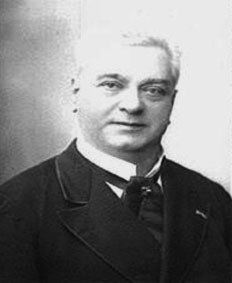
Jules Brasseur (1829-1890) was a French actor and singer, born 1829 in Paris and died in the same city in 1890, who achieved considerable popular success in Paris and around France in the second half of the 19th century.
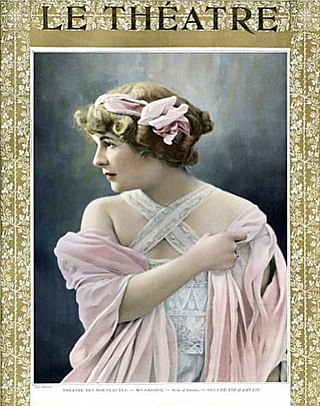
Louise-Armandine Duval, known professionally as Armande Cassive, was a French actress.

Albert Brasseur was the stage name of the French actor Jules Cyrille Albert Dumont.
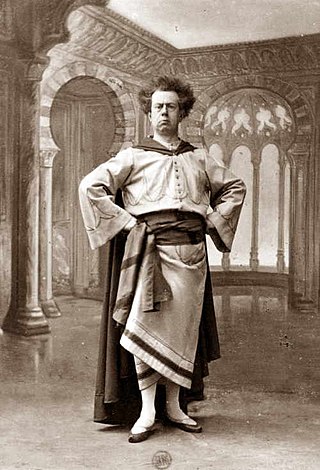
Alfred-Jules Jolly was a French singer and actor. In the first part of his career he featured in operettas in Brussels and later in Paris, creating roles in works by Lecocq, Hervé and Offenbach, among others. From 1884 he switched to the non-musical theatre, based at the Théâtre du Vaudeville, starring in comedies and farces.